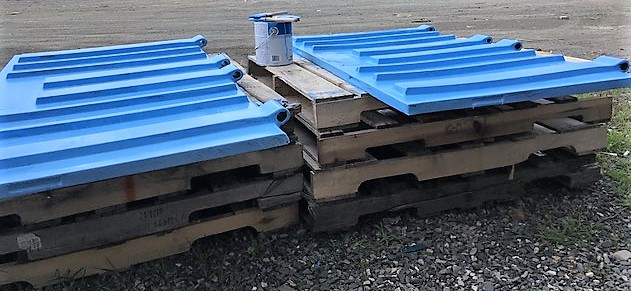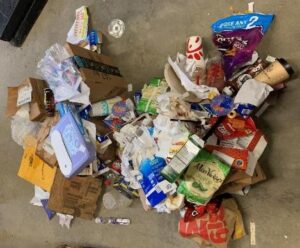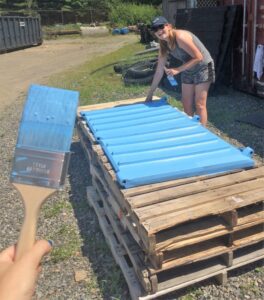Recycling dumpsters get a facelift
By Deborah Paredes ‘20 and Karina Graeter

Residential students at the University of Maine are responsible for taking their own recyclables to the recycling dumpsters near their residence halls. But even the most well-intentioned recyclers can be confused by the two nearly-identical blue dumpsters often sitting side by side — one for recycling and one for trash. The similarities between trash and recycling dumpsters have led to significant contamination of the residence hall recycling stream. When Office of Sustainability Special Projects Assistant Dalton Bouchles conducted an audit of campus recycling last year, he found contamination rates as high as 42 percent in residence hall dumpsters. The most common contamination items were tissues, single-use plastic bags, pizza boxes, and contaminated cardboard.
“We definitely found bags of trash in the recycling loads,” said Bouchles. “Some plastic bags we opened and we searched the entire bag and found no recycling — or maybe like one small recyclable cover. It makes me feel like students were just chucking bags into a dumpster without any consideration if they were recycling dumpsters or trash dumpsters.”

Contamination of the recyclables directly impacts the overall quality of the recycling, and in some instances can make an entire dumpster unrecyclable. To encourage proper recyclable disposal, the Office of Sustainability AmeriCorps team is giving UMaine recycling dumpsters a much-needed facelift by painting the recycling bins with a bright, light blue lid. It is hoped that creating a clearer distinction between the recycling and trash dumpsters will lead to a more successful recycling program with less contamination. Americorps members Jessica Rule and Deborah Paredes spent the summer measuring the dumpsters, designing stencils and painting the lids.

UMaine currently uses Casella’s Zero-Sort recycling service. This means you can place all your recyclables into one container rather than having to sort each type of recycling. While single stream recycling simplifies the recycling process, it does increase the likelihood of recycling contamination.
“Single-stream recycling can have the unfortunate effect of encouraging ‘wish-cycling,’” says Director of Sustainability Dan Dixon. “Wish-cycling is when you toss questionable items in the recycling bin in hopes that they can somehow be recycled. But putting potentially unrecyclable items into the recycling bin can end up costing time and money, and creating more waste. When in doubt, it’s best to throw a questionable item into the trash.”
More information about Zero-Sort recycling at UMaine is online or from the Office of Sustainability at sustainability@maine.edu.
